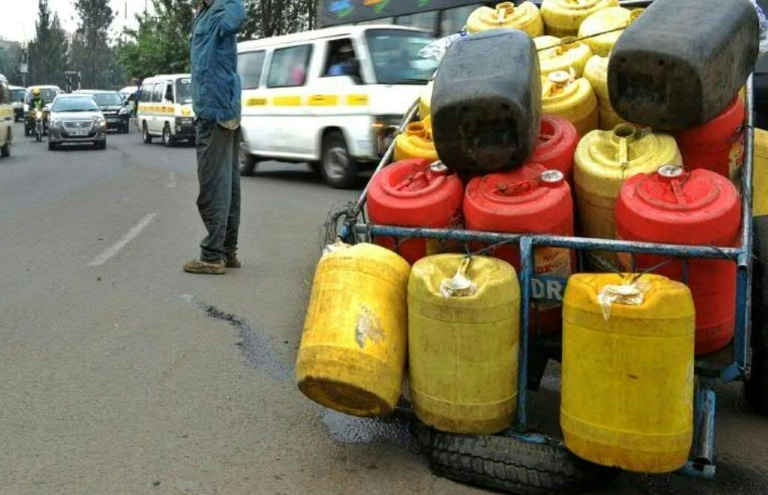You will meet them pushing wheelbarrows or carts popularly known as mkokoteni loaded with Jerrycans of water. These are young energetic people most of whom have dropped out of school to take up a job they feel is more rewarding.
Most of them hail from poor families, and the promise of a future based on their education is dim, causing many to drop out of school and look to survive on the streets.
The water they carry is intended for sale to thousands of households living in Nairobi estates- families who are in dire need of water for domestic use.
One can tell from their demeanor that this is their life – and yes – they still radiate childhood innocence that illuminate their bright faces even as they hasten to make important deliveries to thirsty customers.
Apart from the money – which is not really much – they seem to draw satisfaction from the fact that their hustle keeps many homes, families well watered.
James Otieno is a regular face in Nairobi’s Komarock area – where he has been supplying water to residents since 2018. He is 20 years old. Like many of his friends who are also in the business, he is a school drop-out.
“I dropped out of school in Form 2. I love my job as a water vendor. I am not married, which means I can currently take care of myself from the little money I make from this business,” said Otieno.

Asked why he dropped out of school he said: “My parents could not afford the skyrocketing fees. I had to drop and find something I could do – fast.
“I make between Ksh350 and Ksh500 per day from this business. The only issue is that many young people are getting into the hustle…” said Otieno.
Anthony Wafula is another water vendor in Nairobi’s makongeni area – he too is a school drop-out.
“I am 19 years old and I sell water in my estate. This is where I grew up as a kid. This is what I do for a living. I hawk water,” says Anthony who still lives with his parents in a double room.
To him, water vending is a stable form of income especially in a country where the unemployment rate is surging every minute and especially during the Covid-19 pandemic.
Asked how he got into the business, he says he was introduced by his former schoolmate who dropped out of school after sitting his Kenya Certificate Of Primary Education (KCPE).
For a city where water shortage is perennial, these young people are assured of some good bread at least until Nairobi City Water & Sewerage Company Limited (NCWSC) solves the water shortage puzzle that has bedeviled Nairobi for decades.
Meanwhile – many more youth will most likely be dropping out of school to join their peers who appear to be doing ‘just fine’ hawking water.
In Nairobi’s low-income neighbourhoods, many households are not connected. Those that are connected always experience unsatisfactory service and have to use alternative water suppliers, particularly handcarts. As a result average cost of water reaches up to ten times the lifeline NCWSC tariff.
In the very-low income areas water delivery is almost entirely provided by water kiosks which tend to hike the price up to 25 times the subsidized rate.
“I used to live in Nairobi’s Umoja area but I left because I could not afford Ksh15,000 rent per month – and another Ksh5,000 per month for water.
“To make matters worse, I had to pay more to the young water vendors to carry each 20-litre jerrican to my house on the fourth floor. These young people make money,” said Victor Kisaya.
A 20-litres Jerrycan of water will cost you between Ksh25 and Ksh30 if you are lucky. And one has to pay more if you live on the upper floors just to have it transported.
“I buy a 20-jerry can at Ksh5 from water kiosks or vendors and resell at Ksh25 or Ksh30. It’s a tough job which requires one to eat well and to be in good health to do it. That is why we have to charge high,” Anthony told this writer.
He adds: “Unlike you who are employed, I don’t have medical insurance which means I don’t make money if I don’t go to work.”

